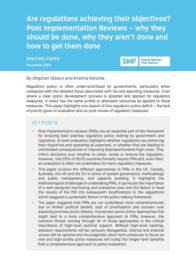Regulatory policy is often under-prioritised by governments, particularly when compared with the detailed focus associated with tax and spending measures. Even where a clear policy development process is adopted and applied for regulatory measures, it rarely has the same profile or attendant resources as applied to fiscal measures. This paper, with a foreword by John Penrose MP, highlights one aspect of this regulatory policy deficit – the lack of priority given to evaluation and ex-post review of regulatory measures.
KEY POINTS
- Post implementation reviews (PIRs) are an essential part of the framework for ensuring best practice regulatory policy making by government and regulators. Ex post evaluation highlights whether regulations are achieving their objectives and operating as expected, or whether they are leading to unintended consequences or imposing disproportionately high costs. They inform decisions over whether to retain, revise or remove the regulation. However, only 25% of OECD countries formally require PIRs and, even then, an evaluation is often not undertaken for many regulatory measures.
- This paper reviews the different approaches to PIRs in the UK, Canada, Australia, the US and the EU in terms of system governance, methodology and public transparency and capacity building. It highlights the methodological challenges in undertaking PIRs, in particular the importance of a well-designed monitoring and evaluation plan and the failure to feed the results of the PIR into subsequent modifications to the regulations which suggests a systematic failure in the policy making framework.
- The paper suggests that PIRs are not undertaken more comprehensively due to: limited political benefit, lack of prioritisation and concern over exposing previous policy failures. It proposes seven policy approaches that might lead to a more comprehensive approach to PIRs, however the common thread running through all of these approaches is the critical importance of high-level political support. Without high-level backing, statutory requirements will be variously disregarded, internal and external voices ignored and the pragmatic short-term pressures to focus on new and high- profile policy measures will trump the longer-term benefits from a comprehensive approach to policy evaluation.

DOWNLOAD THE BRIEFING: PDF
